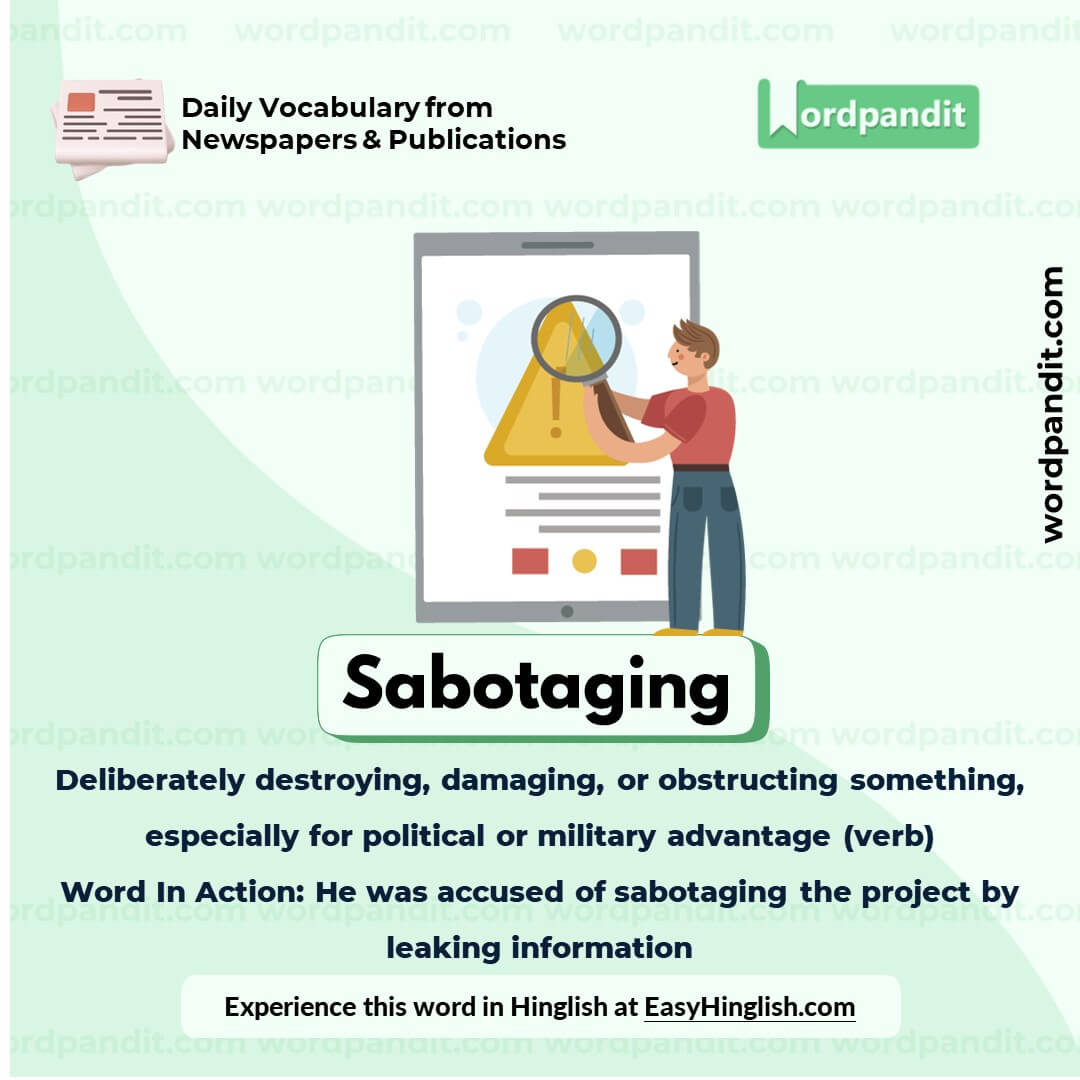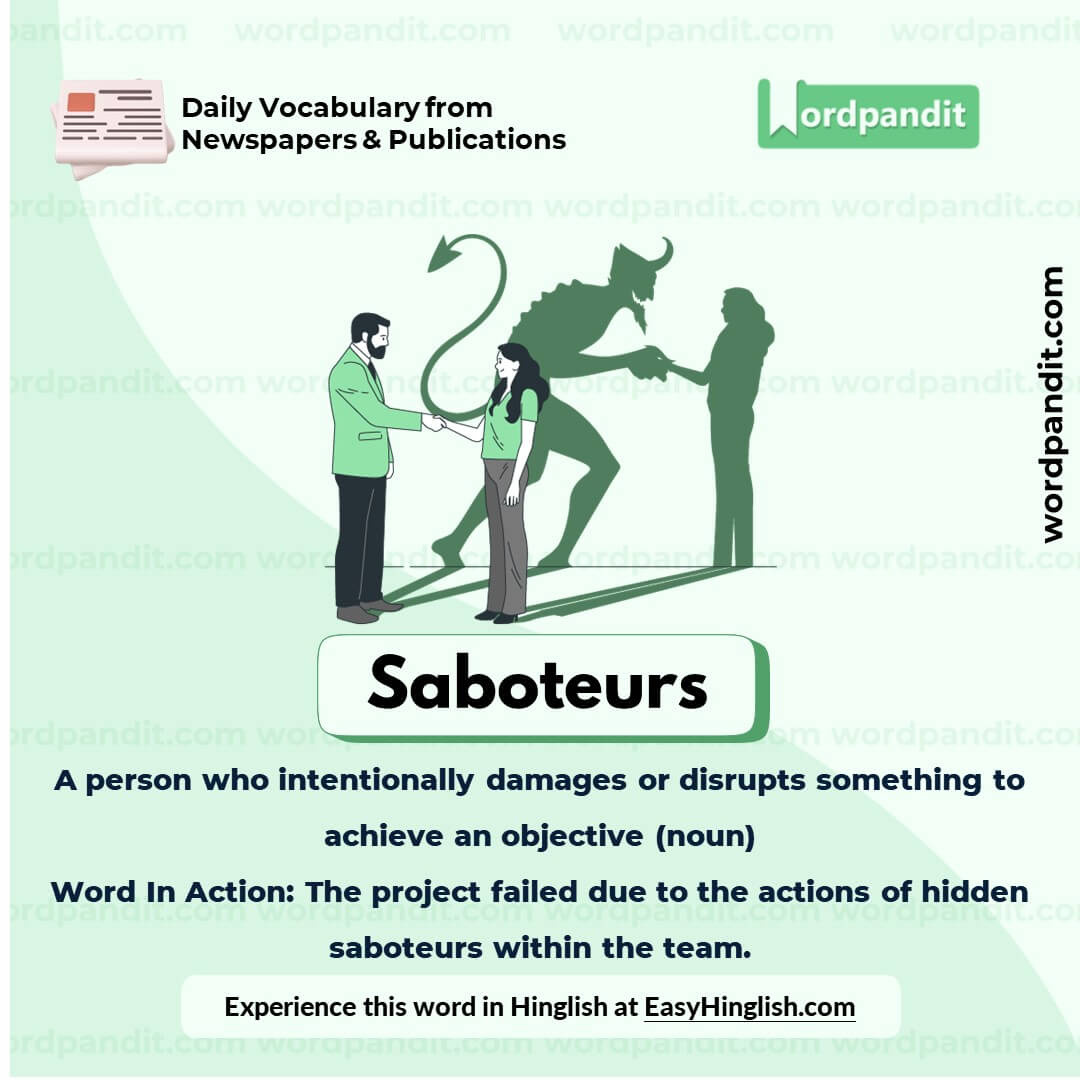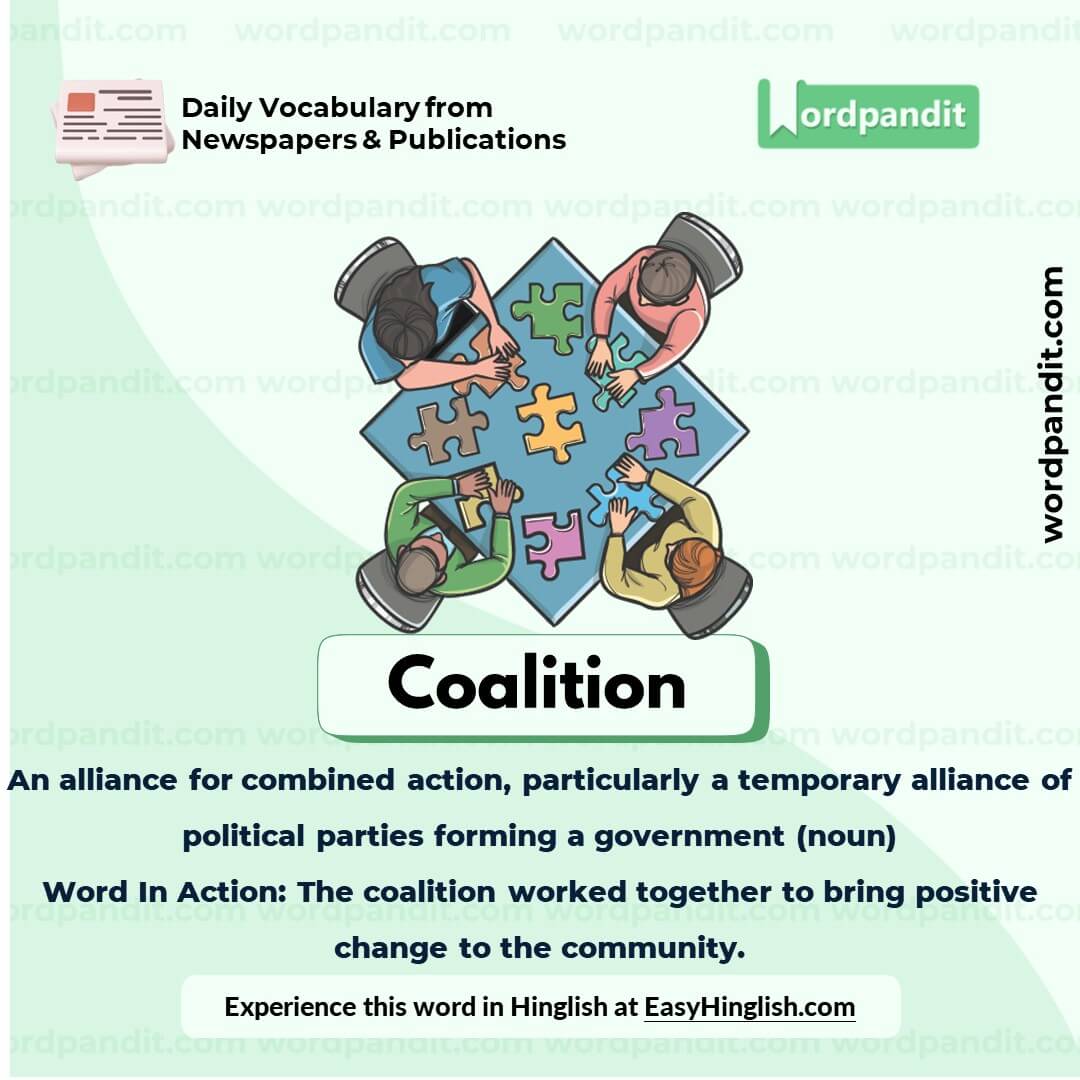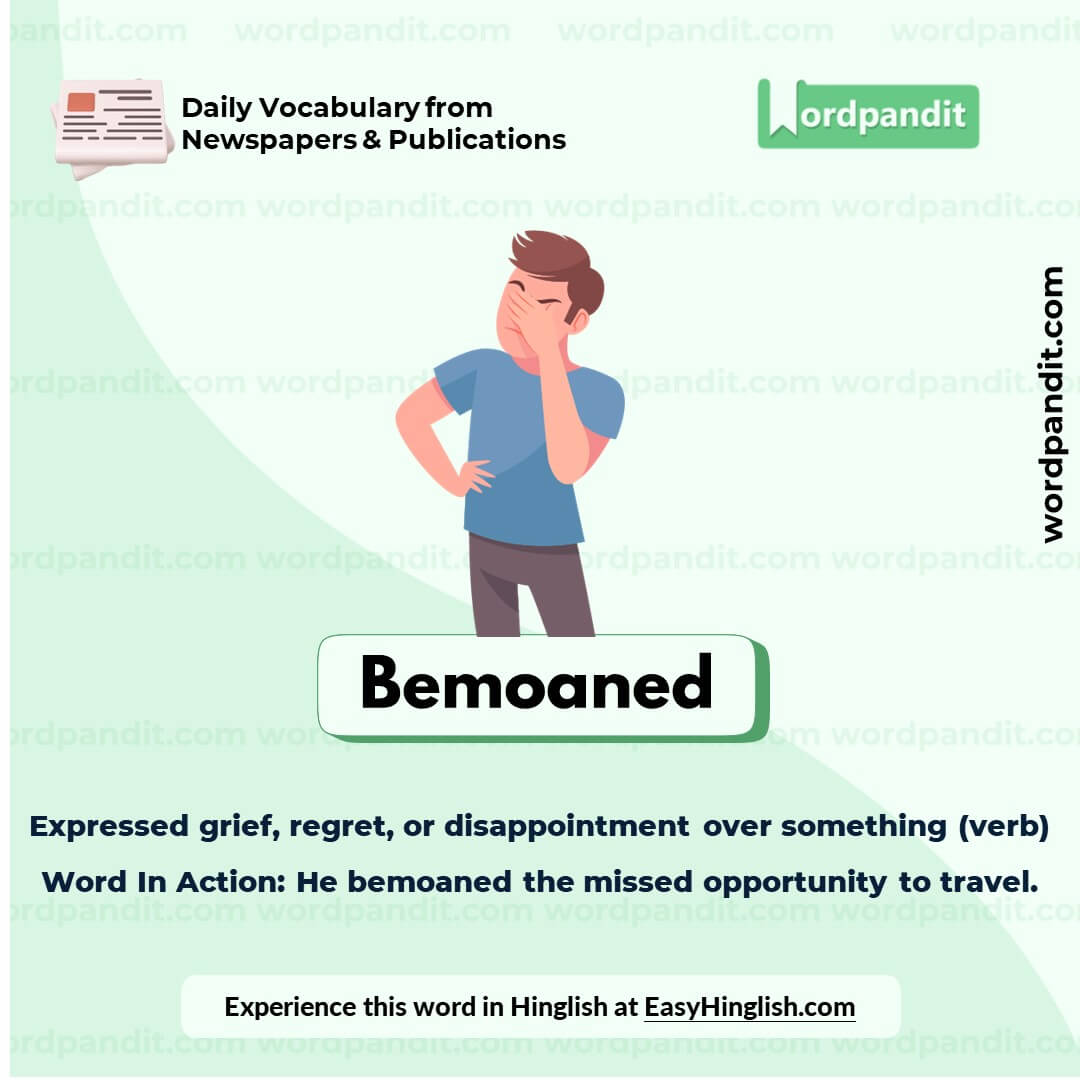Daily Vocabulary from International Newspapers and Publications
Expand Your Vocabulary with Wordpandit’s Global Vocabulary Hub
At Wordpandit, we are committed to helping you develop a truly global vocabulary by drawing from some of the most respected international publications. This section is designed to keep you ahead of the curve by introducing you to words that define global conversations and trends.
The Power of Global Sources
To help you think and communicate on a global scale, we curate vocabulary from renowned international sources, such as:
- The New York Times
- The Washington Post
- BBC
- The Guardian
- The Economist
- Scientific American
- Psychology Today
- And many more...
Stay Global, Stay Competitive
Our daily updates from international publications ensure you are consistently exposed to new words that reflect global news and developments, making sure your vocabulary is not only current but also globally relevant.
Enhance Your Global Perspective
Whether you’re preparing for international exams, aiming to excel in global business communication, or want to enhance your language skills for personal growth, Wordpandit offers the resources you need to thrive in a global context.
Effective Learning, Global Reach
Our learning methodology combines global examples, memory aids, and interactive activities, allowing you to internalize new words effectively and apply them in real-world scenarios.
Begin Your Global Vocabulary Journey Now!
Why Choose Wordpandit?
Practical Learning: Focus on words you'll actually encounter in real-world reading, enhancing your comprehension and communication skills.
Diverse Content: From current affairs to scientific breakthroughs, our varied sources expose you to vocabulary across multiple domains.
Effortless Integration: Make Wordpandit a part of your daily routine. Just a few minutes each day can significantly boost your lexicon over time.
Your Path to Vocabulary Mastery
- Visit our Daily Vocabulary section regularly
- Explore new words and their usage in context
- Practice incorporating these words into your own writing and speech
- Track your progress as your vocabulary expands
Start Your Journey Today
Embark on your vocabulary enhancement journey with Wordpandit. By consistently engaging with our daily posts, you'll build a robust vocabulary that serves you well in academic, professional, and personal contexts.
Remember, a word a day keeps linguistic limitations at bay. Make Wordpandit your daily companion in the quest for vocabulary excellence!
WORD-1: Sabotaging
Context:
"A series of parcel fires targeting courier companies in Poland, Germany and the UK were dry runs aimed at sabotaging flights to the US and Canada, Polish prosecutors say." - BBC
Explanatory Paragraph:
Sabotaging refers to the intentional act of causing damage, disruption, or failure to a system, process, or organization. Often done covertly, sabotage can be aimed at slowing down or stopping activities for various reasons, such as personal motives or political goals.
Meaning: Deliberately destroying, damaging, or obstructing something, especially for political or military advantage (verb)
Pronunciation: SAB-uh-tahj-ing
Difficulty Level: ⭐⭐⭐ (Intermediate)
Etymology: From French sabotage, derived from sabot (wooden shoe), referring to workers allegedly throwing shoes into machinery to damage it.
Synonyms & Antonyms:
Synonyms: disrupt, damage, undermine, obstruct, incapacitate
Antonyms: support, protect, assist, help, enhance
Usage Examples:
- Authorities believe the hacker attempted to sabotage the network during the election.
- The company implemented security measures to prevent anyone from sabotaging their new project.
- His competitors tried to sabotage his campaign by spreading false information.
- The team discovered evidence of someone sabotaging their research efforts.
Cultural Reference:
The term "sabotage" often appears in espionage and spy films, where agents attempt to sabotage enemy plans, illustrating the destructive and strategic nature of the act.
Think About It:
What might motivate someone to sabotage a system or project, and how could such actions impact others involved?
Quick Activity:
Write down an example of sabotage from history or literature. Describe how it changed the course of events.
Memory Tip:
Remember "sabotaging" by picturing a "sabot" (wooden shoe) being thrown into a machine to stop it, as early workers supposedly did to disrupt factory operations.
Real-World Application:
The concept of "sabotaging" applies to cybersecurity, where hackers aim to sabotage networks, highlighting the need for security in protecting digital systems.
WORD-2: Saboteurs
Context:
"Ms Calow-Jaszewska said in a statement that a group of foreign intelligence saboteurs had been involved in sending parcels containing hidden explosives and dangerous materials via courier companies." - BBC
Explanatory Paragraph:
Saboteurs are individuals who deliberately engage in sabotage, aiming to disrupt, damage, or undermine activities, systems, or organizations. They may act for political, personal, or strategic motives and often operate secretly to avoid detection.
Meaning: A person who intentionally damages or disrupts something to achieve an objective (noun)
Pronunciation: SAB-uh-turz
Difficulty Level: ⭐⭐⭐ (Intermediate)
Etymology: Derived from French sabotage (from sabot, meaning “shoe”), referring to early incidents of sabotage where workers allegedly threw shoes into machinery to stop production.
Synonyms & Antonyms:
Synonyms: infiltrators, disruptors, insurgents, destroyers, subverters
Antonyms: protectors, defenders, supporters, allies
Usage Examples:
- The government suspected that the saboteurs were trying to weaken the nation’s infrastructure.
- Security forces increased their vigilance to prevent saboteurs from interfering with the power grid.
- The saboteurs used creative methods to avoid detection while disrupting operations.
- Historically, saboteurs have played key roles in wartime, often working to hinder enemy forces.
Cultural Reference:
In World War II, saboteurs were deployed by various resistance groups to damage enemy supply lines, exemplifying their role in weakening opponents through covert actions.
Think About It:
What might be some ethical considerations surrounding the actions of saboteurs? Are there situations where sabotage might be justified?
Quick Activity:
Write about a historical or fictional saboteur. Describe their motives and the impact of their actions on the broader situation.
Memory Tip:
Think of "saboteurs" as people who "sabotage" plans, using covert methods to create disruption and chaos.
Real-World Application:
The concept of "saboteurs" is often relevant in cybersecurity, where individuals or groups act to undermine digital systems, necessitating robust protections to safeguard information and operations.
WORD-3: Condolences
Context:
"Please know that we do not accept condolences until we have received evidence by the German and American authorities of the reported murder of my father Jimmy Sharmahd and the exact circumstances," his daughter Gazelle Sharmahd wrote on X." - BBC
Explanatory Paragraph:
Condolences are expressions of sympathy or sorrow offered to someone who has experienced a loss, typically after the death of a loved one. Offering condolences is a way to show care, compassion, and support during difficult times.
Meaning: An expression of sympathy, especially after the death of someone close to another person (noun)
Pronunciation: kuhn-DOH-luhn-siz
Difficulty Level: ⭐⭐ (Beginner)
Etymology: From Latin condolere, meaning "to suffer together"; derived from con- (with) + dolere (to grieve)
Synonyms & Antonyms:
Synonyms: sympathies, commiserations, compassion, solace
Antonyms: indifference, disregard
Usage Examples:
- The community offered their condolences to the family of the deceased.
- She expressed her condolences after hearing of her friend's loss.
- Messages of condolences poured in from around the world.
- The company sent a formal letter of condolences to the employee's family.
Cultural Reference:
Offering condolences is a common practice in many cultures and is often accompanied by attending memorial services, sending sympathy cards, or providing meals for the grieving family.
Think About It:
Why do you think offering condolences is such an important social practice, and how can it help those who are grieving?
Quick Activity:
Write a short condolence message that you might send to a friend who has experienced a loss.
Memory Tip:
Remember "condolences" by breaking it down into "con" (with) + "dolor" (pain), symbolizing sharing in someone’s sorrow.
Real-World Application:
The term "condolences" is often used in personal letters, emails, and messages when expressing sympathy to someone who has lost a loved one, helping convey empathy and emotional support.
WORD-4: Coalition
Context:
"The bill will be tabled in parliament by the libertarian Act party, a minor partner in New Zealand’s coalition government, which has regularly called for an end to 'division by race'." - The Guardian
Explanatory Paragraph:
Coalition refers to an alliance or partnership between different groups, parties, or organizations that come together to achieve a common goal. Often used in politics, a coalition typically consists of groups with varying views who collaborate for shared objectives, especially in forming a government or enacting legislation.
Meaning: An alliance for combined action, particularly a temporary alliance of political parties forming a government (noun)
Pronunciation: koh-uh-LISH-uhn
Difficulty Level: ⭐⭐⭐ (Intermediate)
Etymology: From Latin coalitus, meaning "to grow together"; formed from co- (together) + alescere (to grow)
Synonyms & Antonyms:
Synonyms: alliance, partnership, union, bloc, affiliation
Antonyms: separation, division, disunion, rivalry, isolation
Usage Examples:
- The environmental and labor groups formed a coalition to push for stronger regulations.
- The coalition government was formed by two opposing parties to ensure stable leadership.
- The coalition of nations agreed to collaborate on climate change policies.
- A coalition of local businesses supported the community project.
Cultural Reference:
Coalitions are common in parliamentary governments around the world, especially in countries like Germany, where multiple parties often join forces to form a majority, illustrating the importance of collaboration in governance.
Think About It:
How can coalition governments influence policy differently than single-party governments?
Quick Activity:
Identify two or more groups that could benefit from forming a coalition. Explain their common interests and goals.
Memory Tip:
Think of "coalition" as "co- + allies + action," representing groups working together to achieve a goal.
Real-World Application:
In politics, coalition-building allows diverse parties to govern collectively, helping to represent a broader range of perspectives and ensuring stability when no single party has a majority.
WORD-5: Bemoaned
Context:
"He also falsely claimed that he never sold Chinese-made cars on his lots. And at a town hall in September, Mr. Moreno bemoaned how many women were single-issue voters on abortion rights." - The New York Times
Explanatory Paragraph:
Bemoaned is used to describe an expression of sorrow, regret, or disappointment over something. When someone bemoans, they are usually lamenting or complaining about a situation they find frustrating, unfortunate, or troubling.
Meaning: Expressed grief, regret, or disappointment over something (verb)
Pronunciation: bih-MOHND
Difficulty Level: ⭐⭐ (Beginner)
Etymology: From Old English bemænan, meaning "to complain" or "to lament"
Synonyms & Antonyms:
Synonyms: lamented, complained, regretted, mourned, grieved
Antonyms: celebrated, praised, rejoiced, applauded, cheered
Usage Examples:
- She bemoaned the loss of her favorite restaurant in the neighborhood.
- Fans bemoaned the team's poor performance throughout the season.
- The artist bemoaned the lack of funding for creative projects.
- He bemoaned the increasing costs of living in the city.
Cultural Reference:
People often bemoan societal changes, like the rise of technology or the loss of traditional values, reflecting a sense of nostalgia and concern for the future.
Think About It:
Why might people be more likely to bemoan changes rather than celebrate them? What does this say about human nature?
Quick Activity:
Think of something that people commonly bemoan in society today. Write a few sentences about why it might be a source of disappointment or concern.
Memory Tip:
Remember "bemoan" by thinking of "be + moan," as if someone is moaning or complaining about something they find disappointing.
Real-World Application:
The word "bemoaned" is often used in news and opinion pieces, where individuals or groups express frustration over policies, social trends, or economic issues.
















